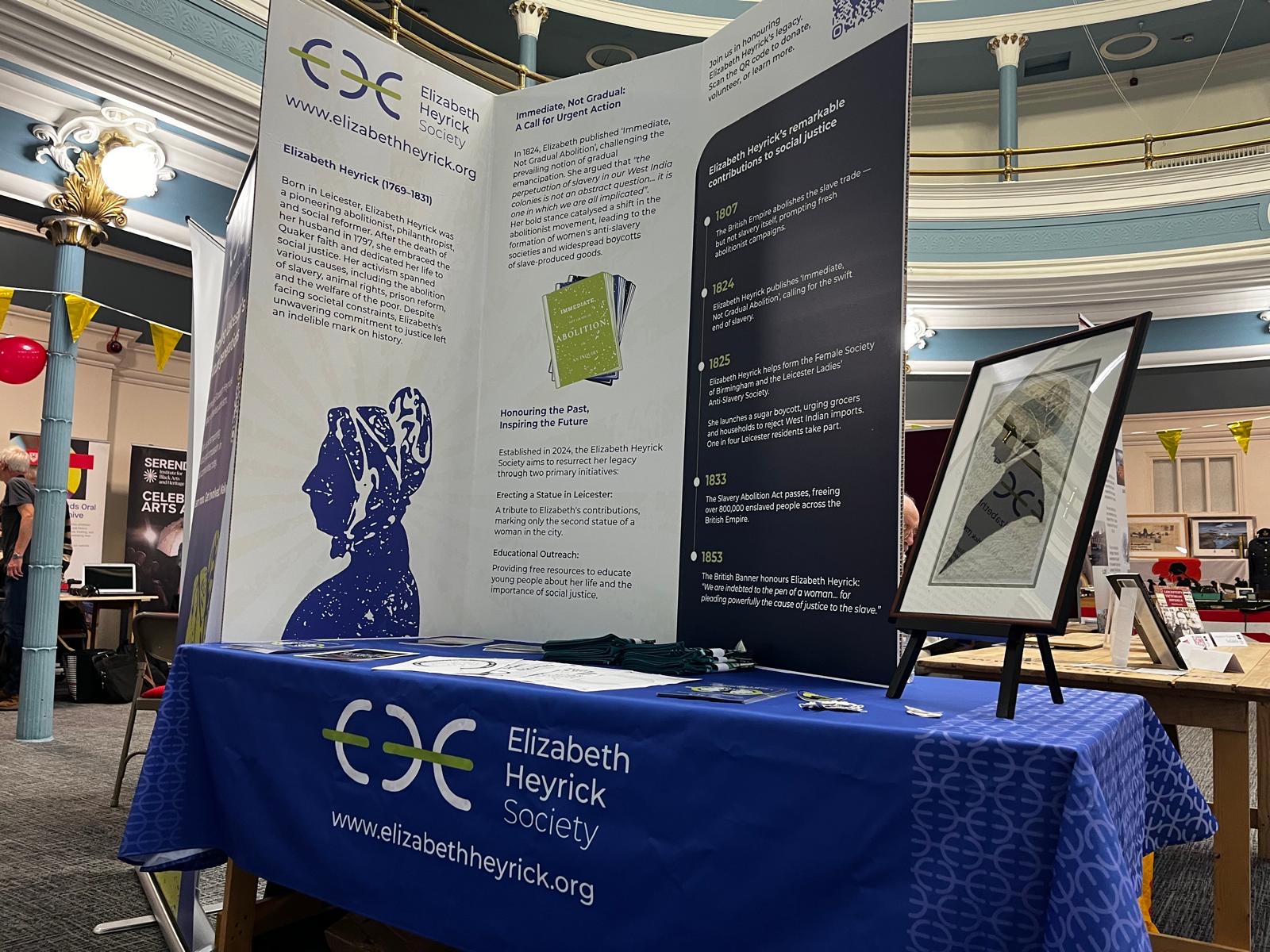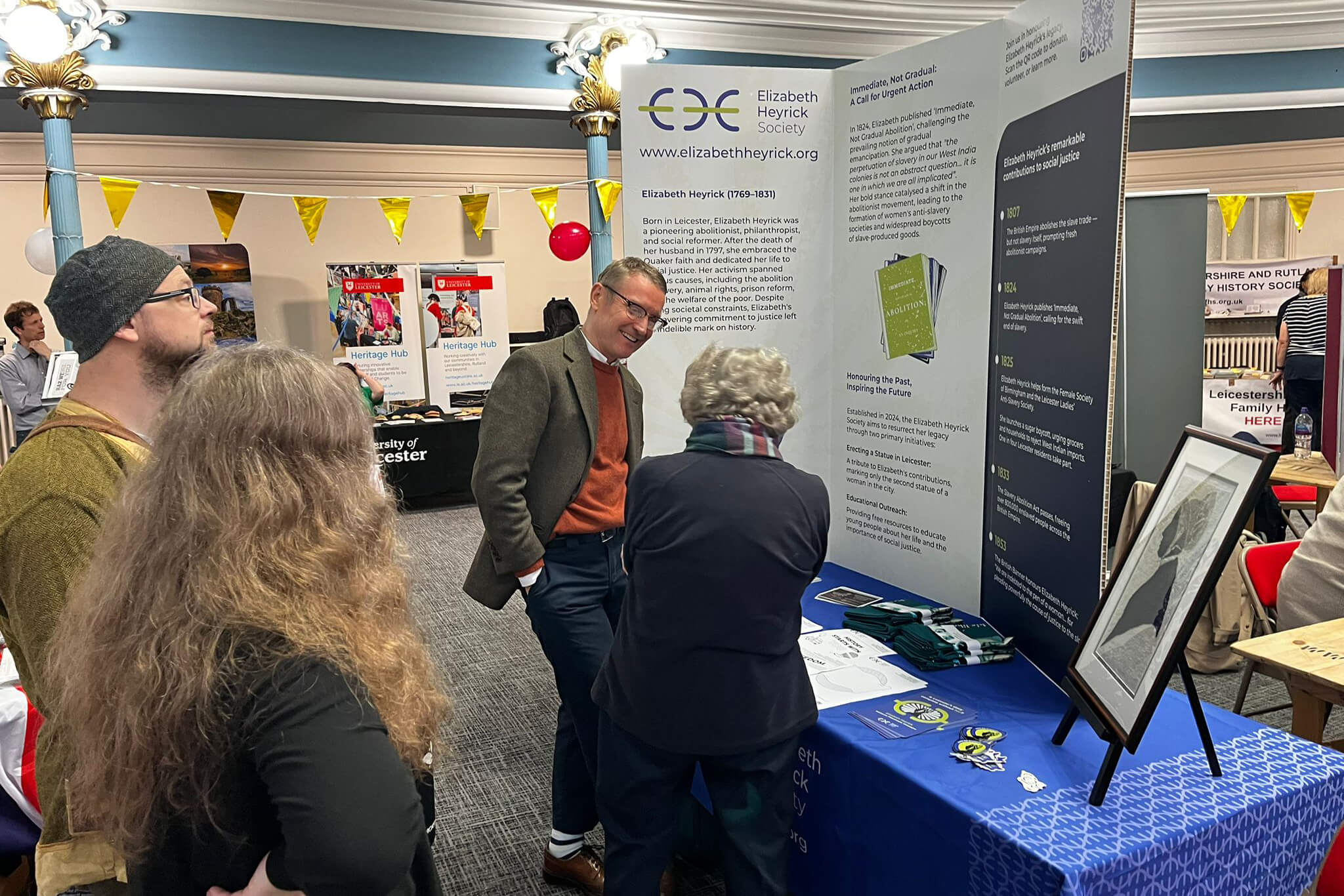Nestled in the undergrowth is the gravestone of one of Leicester’s greatest heroines. It does not bear her name; instead, it is for all those moved to Welford Road Cemetery in 1923 from the graveyard in Gallowtree gate. Elizabeth, once a prominent figure, now rests in anonymity.
Elizabeth Heyrick's name is not widely familiar, yet she played a decisive role in one of the great campaigns in 19th-century Britain: the abolition of slavery within the British Empire in 1833. She organised consumer boycotts of slave-produced goods and wrote powerful polemics to influence those in Parliament and beyond. As a woman, Elizabeth Heyrick was denied the right to vote but worked through the power of popular pressure. Despite her many ground-breaking achievements, her memory has been neglected; there are no monuments, and few people from her home city of Leicester in England would know her name. In what follows, we will explore the story of one of Leicester's forgotten heroines.

Elizabeth Heyrick (1769-1831) was born in Leicester to John Coltman (d.1808), a manufacturer of worsted cloth and Elizabeth Cartwright (1737-1811), a book reviewer and poet. Her parents were dissenters and part of a community of like-minded reformers who actively engaged in discussions about social and political issues of the time. In 1789, she married John Heyrick, a practising lawyer, but she was widowed only eight years later in 1797. Following John Heyrick's death, Elizabeth became a Quaker and dedicated her life to various social reform efforts, sustained by the support and company of a group of like-minded talented women. She wrote over 20 pamphlets advocating for a range of causes including better working conditions and living wages for factory workers, animal welfare, corporal punishment, and prison and political reform. Elizabeth is perhaps best known for the crucial role she played in the 19th-century abolitionist movement.

Trading in slaves within the British Empire was abolished in 1807, but the institution of slavery remained and was the focus of renewed campaigning. Heyrick's most notable contribution to the anti-slavery movement was her influential pamphlet titled Immediate, not Gradual Abolition. Published in 1824, the pamphlet argued for the immediate and unconditional emancipation of slaves, challenging the prevailing notion of gradual emancipation. Heyrick believed that the gradual approach was insufficient and that a more radical and immediate stance was necessary to address the moral and ethical issues surrounding slavery. Her uncompromising stance drew both support and criticism within the abolitionist circles, but it left a lasting mark on the movement and led to the British campaign deciding on an immediate approach. Despite facing criticism from leading figures such as William Wilberforce (1759-1833) and Thomas Clarkson (1760-1846), Heyrick remained steadfast in her commitment to the cause.
Several editions of Immediate, not Gradual Abolition were published in the United States during the 1830s and helped influence the campaigns of prominent abolitionists such as Frederick Douglass (1818-1895), William Lloyd Garrison (1805-1879) and Lucretia Mott (1793-1880). Generally, pamphlets were published anonymously, but American publishers chose to use Heyrick's name and added a preface suggesting the pamphlet had been a huge advantage in the British abolition campaigns, particularly in urging the switch from a gradual phasing out to an immediate abolition. It is clear the pamphlet resonated with William Lloyd Garrison; in 1833, during a public speech in Glasgow, he singled out Heyrick’s contribution:
‘Who first gave the world the doctrine of immediate emancipation? It was a woman in England - Elizabeth Heyrick… Mrs Heyrick was the highly respected, talented and uncompromising friend of liberty…’.

Beyond her writings, Heyrick engaged in practical efforts to promote immediate abolition. She was a founding member of the Female Society of Birmingham in 1825, the first anti-slavery society for women in the world. Heyrick was instrumental in forming the Leicester Ladies’ Anti-Slavery Society, alongside notable abolitionists Lucy Townsend (1781-1847), Mary Lloyd (1795-1865), Sarah Wedgwood (1776-1856), Susannah Watts (1768-1842), and Sophia Sturge (1795-1845). An earlier consumer boycott of sugar products as part of the anti-slave trade campaign was revived. In Leicester, Elizabeth personally distributed literature and organised a sugar boycott urging grocers not to stock West Indian imports, and by 1825, roughly twenty-five percent of the city's population had stopped buying West Indian sugar.

Elizabeth Heyrick passed away on 18 October 1831, leaving behind a lasting impact on the fight against slavery. Her efforts contributed to the growing momentum of the abolitionist movement in the United Kingdom and the United States and laid the groundwork for future activists and leaders who would eventually see the abolition of slavery in the British Empire in 1833. Her story provides a crucial example for future generations, showing that, with ambition and determination, an individual can change the world for the better.





